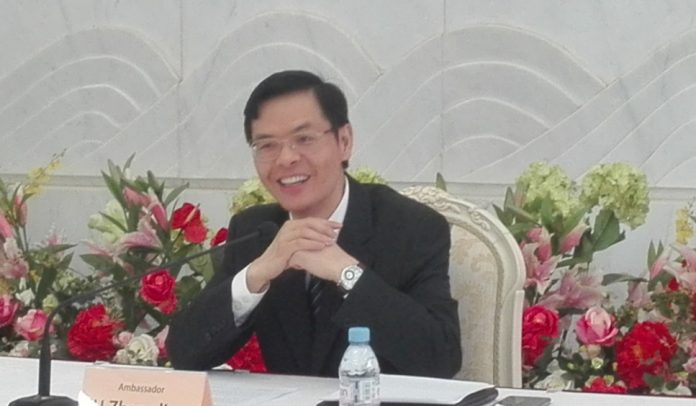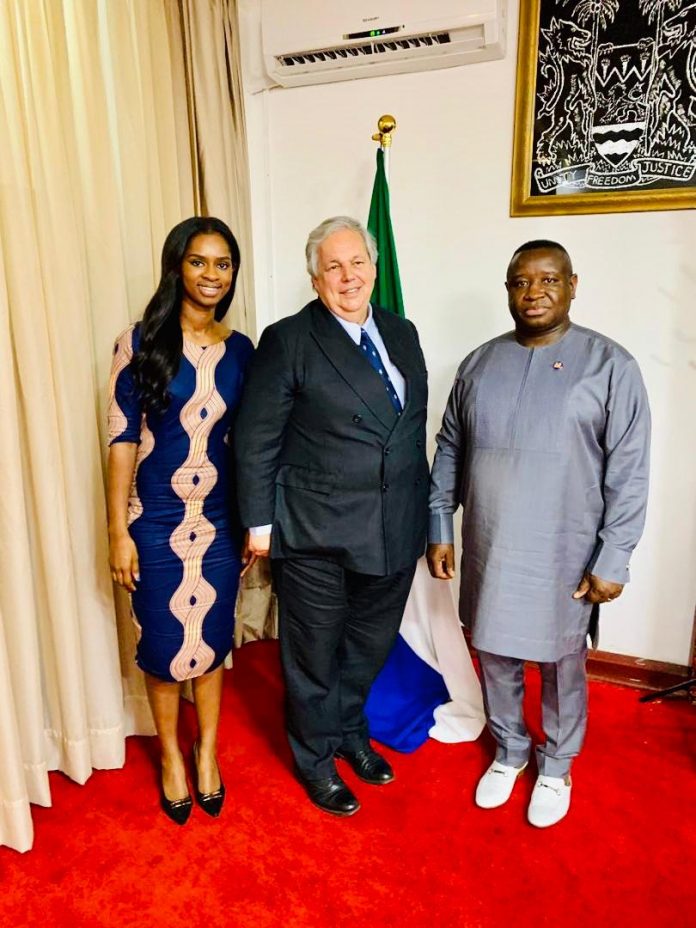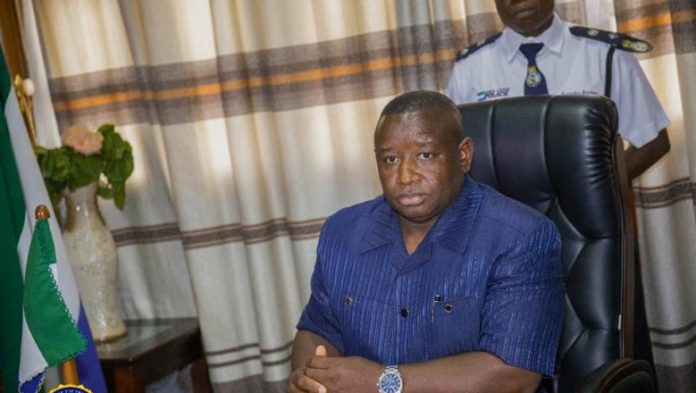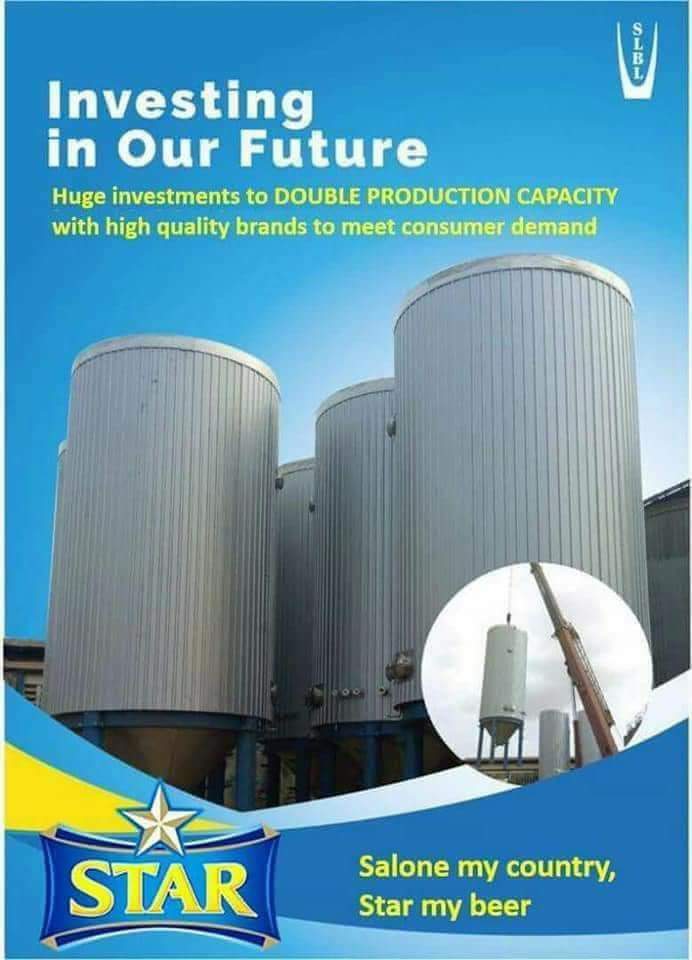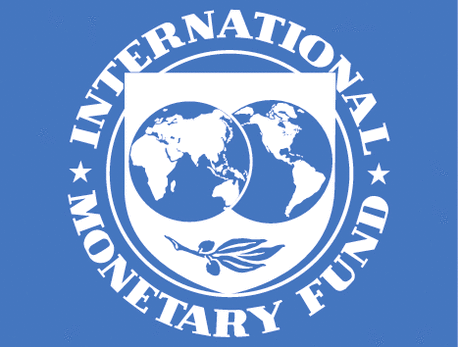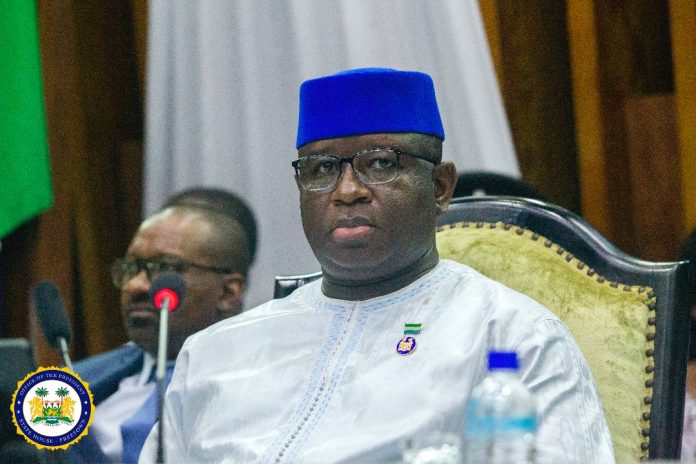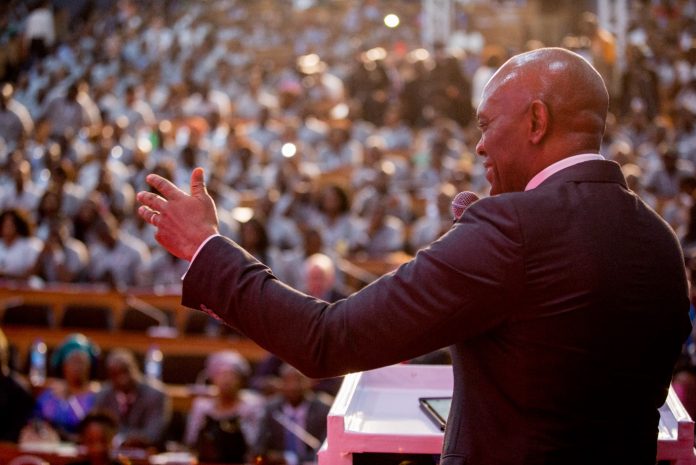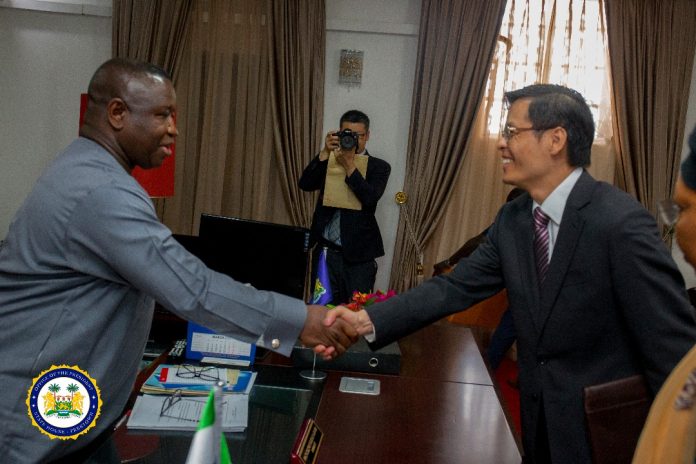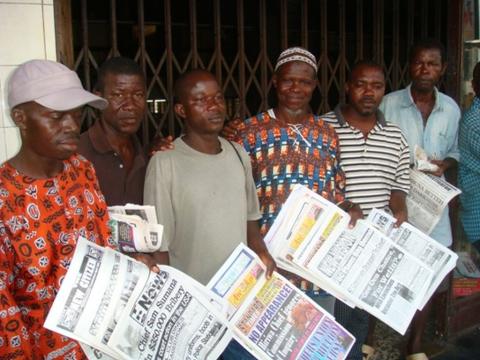The new Chinese Ambassador to Sierra Leone Hu Zhangliang informed journalists that he was posted here to pursue the Sino-Sierra Leone dream as both countries will be celebrating 48 years of excellent relationship.
Ambassador Hu Zhanliang said Sierra Leone is respected by China for what they did 48 years ago and that respect have seen China ready to work with the government of Sierra Leone to undertake economic and developmental projects that will be of immense value to the country.
“Recently I was with President Bio when the Juba Bridge was opened that was built by China Railway Seventh Group (CRSG) with funds from both countries. These are the kind of projects that China is looking forward to continue to work with the Government to achieve more of such projects,” he noted.
Ambassador Hu said China and Sierra Leone have always belonged to a community of shared future. Over the past five decades, they have always been good friends who stand together through thick and thin, good partners who share weal and woe, and good brothers who fully trust each other despite changes in the international landscape.
“China always adheres to the principles of its Sierra Leone policy — sincerity, practical results, affinity and good faith, upholds the values of friendship, justice and shared interests, and push for new leapfrog growth of its friendly and mutually beneficial cooperation with Sierra Leone. It never interferes in the internal affairs, never imposes its will on them, and attaches no political strings when providing aid to Sierra Leone.”
The Ambassador said in September 2019, President Xi Jinping announced “Eight Major Initiatives” for China-Africa cooperation at FOCAC Beijing Summit in the coming three and more years, namely, industrial promotion, infrastructure connectivity, trade facilitation, green development, capacity building, health care, people-to-people exchange, and peace and security, depicted the blueprint for developing China-Africa cooperation in the new era.
“China has and will continue to create greater synergy with Sierra Leone, select cooperation fields and fully tap into the strengths of each other to effectively implement the FOCAC Beijing Summit outcomes.”
Talking on the Belt and Road Initiative (BRI), Ambassador Hu Zhangliang said Although protectionism and unilateralism are mounting these days, China he said will continue to hold high the banner of peace, development, cooperation, and mutual benefit and uphold its fundamental foreign policy goal of preserving world peace and promoting common development, and to forge a new form of international relations featuring mutual respect, fairness, justice, and win-win cooperation, to build a community with a shared future for humanity.
He said Sierra Leone has signed up to the BRI and there will be more benefits for Sierra Leone in the near future.
“In autumn of 2013, President Xi Jinping proposed that jointly build the “Belt and Road” Initiative (BRI) to enhance both China’s development and its cooperation with global partners and focus on the future of human development. The BRI has yielded remarkable achievements and fruitful results since its inception six years ago, becoming an international cooperative platform with extensive participation and a popular public good in the world today.”
Ambassador Hu Zhangliang said all of this shows that Belt and Road cooperation is in sync with the times, widely supported, people-centered and beneficial to all. This year’s forum he said sends a clear message and more and more friends and partners will join the BRI, and the cooperation will enjoy higher quality and brighter prospects. The “Belt and Road” initiative originated in China, and the opportunities and achievements the Ambassador said belong to the world.
“This year marks the 70th anniversary of the founding of the People’s Republic of China, and over the past 70 years, under the strong and correct leadership of the communist party of China (CPC), the people have forged ahead as one in the last 70 years and made great strides that have truly impressed the world.
“Firstly, China’s economy has grown by epoch-making leaps and bounds and when China was founded in 1949, it was a poor and backward agricultural country. Today, China’s GDP totaled $12 trillion, accounting for about 15 percent of the world economy. China has become the world’s second largest economy, the largest industrial country, the largest trading nation of goods, the largest foreign exchange reserve country and top producer of more than 220 products.”
He said at present, China’s economy has shifted from high-speed growth to high-quality development. China has made major breakthroughs in high-tech fields such as manned spaceflight, lunar exploration, deep sea submersible, supercomputing, beidou navigation and quantum communication, and is at the world’s advanced level in high-speed rail, mobile communications and nuclear power.
“Secondly, living standards of the Chinese people have significantly improved. The Chinese people have emerged from scarcity to abundance and from poverty to moderate prosperity. With this, China realized the UN Millennium Development Goal as well as UN Sustainable Agenda for poverty reduction ahead of schedule.
“Between 1949 and 2018, China’s per capita GDP increased from 27 US Dollars to nearly 10,000 US Dollars. According to current UN standards, more than 700 million Chinese people have been lifted out of poverty. The largest middle-income grouping the world has been formed in China with a scale of over 400 million people.”
Ambassador Hu said China’s relations with the world have been transformed historically. The once closed and semi-closed country becomes one that opens up on all fronts.
“Today, China is a contributor to world economy. China’s contribution to the world economic growth has surpassed 30% for many years consecutively and it has been a key engine driving world economic growth. As the world’s largest developing country, China is a sincere friend and close partner of other developing countries. Through experience sharing, aid and personnel training, China has supported other developing countries in their fight against poverty.”
He rounded up by saying that as of today; China has provided nearly 400 billion Yuan in development aid to more than 160 countries and international organizations, and as of the end of 2017, China’s foreign direct investment stock was 1.8 trillion US dollars, ranking second in the world.
New Chinese Ambassador Promises to Strengthen Sino-Sierra Leone Ties
Westminster Plans Bigger Investments in Sierra Leone
Chairman of Westminster Group, a London-based company, the Right Hon. Sir Tony Baldry has told journalists that he is in town to see how the company is moving and to look at ways to continue investing in the country.
He said Westminster is a British owned company with all the shareholders being British and the company is listed in the London Stock Exchange, and they are operating in about 50 countries across the world.
“We started operating in Sierra Leone in 2012 when the country was in dire need of a profession company to handle the ground handling of the Lungi airport. At that time we sent in 30 experts to work with Sierra Leoneans and today only three are still in the country adhering to the Local Content Policy.”
Hon. Tony Baldry said they have spent millions of Pounds to raise the handling standard of the airport and today the airport is safe and with less complaints of stealing luggage. He said they will continue to invest in modern equipment and sniffer dogs because wherever they work they believe in giving quality and adhering to standard.
He said he met with President Bio and Vice President Juldeh Bah as he said he cannot come to Sierra Leone and doesn’t meet with the President to discuss on how his company can help in the development process of the country.
“Discussing with President Bio was an opportunity as we talked about how to modernize the airport, how we can work on bringing down the ticket prices, to get direct flights from London to Sierra Leone, ecotourism and how we can help in the investment conference next month in London.”
Hon. Tony Baldry said the Government and Westminster will start talks soon on how they can reduce the price of tickets so that it can be at par with other Mano River Union countries so that Sierra Leone too will be competitive.
“On my return I will look for flights that will start operating between London and Sierra Leone as presently there is no direct flight between the two countries. I will try and all my best to make sure that we get cheap flight to operate this route. Today in Uganda and Kenya ecotourism is doing very well and I am sure it will be the same for Sierra Leone, so it is another area that we will pursue to help the tourism sector grow in the country.”
The Chairman said they are the only British company working in Saudi Arabia and Iran and they have partners in Saudi Arabia for ecotourism that they will talk to for them to come and invest in Sierra Leone. He said Sierra Leone has all it takes to develop ecotourism in the country and he is determined to see it grow in Sierra Leone.
“I was told by the President of the investment conference to be held next month in London that Sierra Leone is a prominent participant. We discussed at length on how Westminster will be of immense help to work with the Sierra Leone High Commission in London to make sure the conference is successful. As we are one of two British companies in Sierra Leone, we would be at a vantage point to entice more British companies to come and invest in Sierra Leone. We will do all in our power to make sure that this investment conference becomes successful that will see more British companies coming to invest.”
When asked about the atmosphere in Sierra Leone for investors, Hon Tony Baldry said if the atmosphere was not conducive, Westminster will not be here. He said in every country there are challenges, but those challenges are always overcome. He said with more investment in the country it will create more job opportunities, services and products for the people.
The Chairman averred that Sierra Leone is open for business and the President is doing all in his power to attract more investors in various areas. He said they will look at other areas like agriculture also to invest and he will not relent to help bring investors into the country.
7 Days Ultimatum for Government
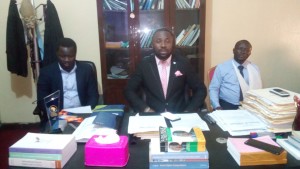
A Non- Governmental Organization, Christian Lawyers Centre, also known as Legal Link on Monday 6th May 2019 released a Press Statement in reaction to an alleged assault of one of its Legal Volunteers, Morlai Kanu Conteh, by two military officers who were manning the main entrance to the Parliament building during the State Opening of the House on Thursday 2nd May 2019.
In an exclusive interview, Morlai Kanu Conteh disclosed that on that fateful day he was officially invited to the State Opening of Parliament in his capacity as President of the National Youth Coalition and at the time when the APC Parliamentarians were walking out, he came outside to have a clearer picture of what was happening for proper and accurate reporting.
He further narrated how he was attacked by two military officers dressed in military fatigues saying they were dark skinned in complexion.
“One of the officers even remarked that they beat me up because of my criticisms against the ruling SLPP Government on TV and Radio while the other OSD officer even threatened to shoot me,” he bemoaned.
He sustained a swollen rib, arm and face due to the severe blows and kicks he received from his alleged military attackers. Morlai Kanu Conteh is currently responding to medical treatment.
In the wake of the incident, Christian Lawyers Centre, an organization that defends the rights of human rights defenders in Sierra Leone, made recommendations that they stated should be looked into as soon as possible some of which are as follows:
1. That an independent investigation by the military be undertaken to weed out these few bad cops that are trying to dent the good image of the military in Sierra Leone.
2. That the Chief of Defence Staff must come out openly and denounce this unprofessional behavior of these two military officers against a civil society activist.
3. That an open apology be made by the administrative head of the military to the civil society activist and all medical expenses incurred by fully reimbursed.
4. That the Government of Sierra Leone and the Parliament endeavor to pass a law that will protect the rights of Human Rights Defenders in the country.
Rashid Dumbuya Esq., Executive Director of Christian Lawyers Centre (Legal Link) said the following recommendations should be adhered to within the next 7 days, if not they will be left with no option but to institute criminal actions against the administrative heads of the military to be held liable for the acts of their subordinate officers.
Another Civil Society Organization, Campaign for Good Governance condemned the actions of the two military officers. Its Executive Director, Madam Marcella Samba-Sesay stated that: “We view such an attack as completely unwarranted and a veil threat to silencing critical civic voices on national issues, thereby reducing the scope for genuine political participation and advocacy in Sierra Leone. We therefore urge the Government to take immediate steps to ensure that the right to defend human rights and fundamental freedoms are respected, protected and fulfilled.”
NP: Sierra Leone’s Most Reliable Fuel Provider
The National Petroleum (NP) Sierra Leone Limited has been lauded for its invaluable contributions towards building up the country’s economy.
As petroleum business entity NP is proud of having various filling stations in various parts of the country and it is vibrantly functioning in Guinea, Liberia, Ivory Coast and the Gambia.
This 100% indigenously-owned company has so far offered various jobs to residents in the afore-mentioned countries, thereby reducing poverty to a considerable level.
It is further recorded that it is one of the largest taxpayers to the National Revenue Authority (NRA), financially empowering the Government to roll out various development projects.
Without mincing the truth, NP has a capable and competent managerial team at the helm of affairs, which from time to time comes up with good initiatives, always ensuring that those initiatives are effusively, effectively implemented to create value for money.
Since it was established by 35 Sierra Leoneans, who bought shares from the Government years back, the company has grown from leaps and bounds; weathering storms that would have run it down. But the resolve of its shareholders and Management to succeed has been the centrepiece that has propelled NP to a higher level, equal to none in the sub-region. The synergy that runs through its members of staff has also contributed to the company’s growth.
If you ask those who really know NP, the feedbacks you will receive will definitely border around its commitment to customer care, which the company strongly believes must be prioritised to give satisfaction.
The selflessness and commitment of the shareholders have made it possible for the company to empower many Sierra Leoneans and at the same time put it at a vantage position to continue to open more filling stations across the country.
NP has cordially maintained a good business relationship with its numerous customers right across the sub-region where it exists and most have confessed that they are realizing optimum satisfaction in dealing with NP. The company deals with individuals and various sectors of society, always ensuring that its various petroleum products are available and are sold at affordable prices. This keen symbiotic relationship with its customers has been paying huge dividends, always resulting in a win-win situation, making NP very endearing to all and sundry.
The regulatory institution of the different petroleum companies in the country, Petroleum Directorate, has lauded NP for its efficient service delivery wherever it is operating.
The company is also known for offering Sierra Leoneans affordable NP Gas cookers of various sizes, which are safe and very friendly to use. NP Gas cookers could be purchased at all their filling stations across the country and the very gas is also sold to replenish those that have been used.
When we talk of the steady and effective implementation of the Local Content Policy, NP stands out tall as it is truly has 100% indigenes, particularly in Sierra Leone, as workers. This is one of the factors that have made the company to be a success story.
The company’s result-oriented managerial team will definitely and sustainably continue to put NP at the top.
NP-SL Ltd is doing exceptionally well in all the countries it is functioning and indeed there are prospects for further expansion.
It can therefore be justifiably asserted that the National Petroleum Limited is the country’s reliable fuel provider as it always ensures that its stockpile is always at an appreciable level.
Brewery Continues to make In-roads in & out of the Country
As it continues to make landmark achievements in and out of Sierra Leone the result oriented Sierra Leone Brewery Limited (SLBL) in collaboration with Krones, a German firm that specializes in the supply and modernization of production plants, together with a large team of SLBL’s locally trained Sierra Leonean engineers and technicians have recently successfully installed and started operating a new production line.
This project which cost over Le 278 billion is one of the most expensive which the Brewery embarked upon to expand and upgrade its facilities. It was another large investment of the company to the economy and manufacturing sector of Sierra Leone, which is a major step in the improvement of their facilities in their journey of reaching state-of-the-art status.
In the same vein, the SLBL quite recently collaborated with the Freetown City Council to support sanitation projects in Ward 406 worth over 400 million Leones through Heineken Africa Foundation (HAF) and also provided a Toyota Dyna van to collect and dispose waste. This has been going on since 2017.
It could be recalled that the SLBL has been playing a key role in maintaining sanitation in its local community since its establishment.
The Sierra Leone Brewery as part of its Corporate Social Responsibility (CSR) in Wellington, where its factory is located has done much to develop communities including Peacock Farm such development interventions have been of great assistance to especially women and children.
Providing safe water and encouraging women’s participation in agriculture and other economic activities have been the main thrust of the SLBL over the years. The SLBL is ensuring through small water enterprises that businesses provide safe, reliable, affordable water to communities in need; agencies that create economic opportunities for women to create benefits to their communities and be able to contribute to the health and well-being of families.
Sierra Leone Brewery Limited (SLBL) is indeed making steady progress in its production chain. The company has been rated as one of the most progressive business entities that have been positively contributing to overall national development impacting meaningfully on the lives of many people.
In order to ensure that the company continues to meet the needs of its numerous esteemed customers in and out of the country it is heavily investing in both capital and human resources with the view to make use of latest machinery and best brains that will collectively add value to its production drive.
The SLBL can now boast of having increased fermentation tanks; an upgraded waste water treatment plant, mash filter equipment and cooling plants thus putting it on a better stead to produce qualitative and safe beverages which many have confessed are of high standards.
It should be mentioned that in addition to the many great things the SLBL is doing for the people of this country and in accordance with government policy, the SLBL is ensuring that in the provinces there are farmers who grow sorghum and the company is in close relationship with them going to the extent of continuously empowering them through trainings and inputs. These sorghum farmers, who are over 25,000,000 in number, are steadily supplying the Brewery with the ingredients the company needs and by so doing they are becoming financially independent.
The Sierra Leone Brewery Limited is tax compliant and is contributing towards local revenue mobilization that is helping government to have the financial muscle to fund different development programs across the country.
In an earlier development, SLBL Corporate Affairs Manager, Albert Ojo Collier, disclosed to the press that they have invested over 278 billion Leones in the last three years as part of their expansion project to meet international standards and the growing demands of customers. He made this disclosure during a recent press tour for journalists conducted at the SLBL head office, Wellington Industrial Estate, East of Freetown.
He informed journalists that ‘in order to upgrade our Brew House, we recently overhauled our packaging bottling line costing 3.5 billion Leones. Since 1962, we pride ourselves with that rich heritage tied to the history of the country, with a vision of growing with Sierra Leone to further improve the efficiency of our bottling operations and to ensure our service to our revered customers and consumers.’
In a most recent development, the Sierra Leone Brewery Limited (SLBL) on Tuesday 30th April, 2019 commissioned submersible solar-powered water wells, one in Kamara Town and in another nearby community. This is the fifth out of seven that have been commissioned so far in the Wellington Industrial area.
During the commissioning the Corporate Affairs Manager, Albert Ojo Collier, informed his large audience that the project which was supported by Heineken Africa Foundation amounted to EUR 69, 4.
He called on Sierra Leoneans and especially those directly benefitting from the project to ensure they take good care of the submersible solar-powered water well and report anyone found damaging or stealing from these facilities.
IMF Mission First Review ECF Ends
In what has been described as positive development the Sierra Leone authorities and IMF mission concluded discussions, ad referendum, on economic policies to pave the way for consideration by the IMF Executive Board of the first review under the ECF-supported program; continued actions to mobilize revenue and manage public finances remain key priorities to reduce public debt and create fiscal space for investing in people and infrastructure; stepping up structural reform efforts will be crucial to managing fiscal risks, ensuring greater accountability, and diversifying the economy for the benefit of all Sierra Leoneans.
An International Monetary Fund (IMF) mission, led by Karen Ongley, visited Freetown during April 23-May 7, 2019 to conduct the first review of the Extended Credit Facility (ECF) arrangement approved by the Executive Board on November 30, 2018.
At the end of the visit, Ms. Ongley issued the following statement:
“The economic landscape in Sierra Leone remains challenging. Yet, the authorities navigated these difficulties well in the year since taking office, helping to stabilize the economy. Real GDP looks set to pick up this year to 5.1 percent, thanks in part to the resumption of iron ore mining. After peaking above 19 percent last September, inflation moderated to 17.5 percent in March and is projected to continue tracking down over 2019.
“Faced with serious constraints on budget financing, the authorities kept the budget in check through stronger than programmed revenue performance and spending well below the budget. As a result, the overall deficit narrowed from 8.8 percent in 2017 to 5.8 percent in 2018. However, delays in donor receipts and uneven liquidity in the banking system, posed challenges for deficit financing and monetary policy, and impacted program performance.
“While program performance is broadly on track, slower than expected progress on structural reforms reflects the magnitude of policy challenges. Nine of the ten quantitative targets were met for end December 2018 and end March 2019. However, the Net Domestic Assets of the Bank of Sierra Leone (BSL) at end December 2018 exceeded the program target (performance criterion), partly due to BSL’s credit to government and continued foreign exchange market sales to stem depreciation of the Leone. Moreover, three of five structural benchmarks—the forensic audit of the BSL, developing a strategic plan for the two state-owned banks, and a strategy for clearing domestic arrears—have been delayed, as the underlying issues are proving to be more complex than anticipated.
“With this in mind, the Sierra Leonean authorities and the mission reached understandings, ad referendum, on economic policies aimed at enhancing accountability in managing public resources, diversifying the economy and promoting more resilient and inclusive growth. The authorities’ commitment to mobilizing domestic revenue and improving expenditure management to achieve a gradual reduction in the deficit will help ensure that public debt returns to a sustainable path. Notwithstanding pressures on the budget, the authorities will safeguard poverty-reducing spending and other priority spending under the Government’s National Development Plan. Limiting the recourse to domestic financing will also reinforce the BSL’s objective of bringing inflation down to single digits by the end of the program. Maintaining a flexible exchange rate system and increasing foreign exchange reserves will boost resilience to economic shocks.
“The authorities have calibrated their policies to address longstanding vulnerabilities, but this also requires maintaining policy discipline and stamina. Notwithstanding their ambitious revenue goals, the program reflects a more cautious revenue assumption as a buffer to deal with fiscal risks, such as reliance on donor financing, the large outstanding stock of domestic arrears, and high prospective debt service payments. Stepping up efforts on the structural reforms underpinning the program is crucial to the goals of managing fiscal risks and ensuring greater accountability for the benefit of all Sierra Leoneans.
“The IMF’s Executive Board is expected to consider first ECF review by end-June 2019. Completion of the review would make available SDR 15.56 million (US$ 21.5 million), bringing total disbursements under the program to about SDR 31 million (US$ 43 million).
“The mission met with Vice President Jalloh, Minister of Finance Jacob Saffa, Deputy Minister of Finance Patricia Laverley, Governor of BSL Kelfala Kallon, Finance Secretary Sahr Jusu, other senior government and BSL officials, representatives of the financial sector, civil society, and development partners. Mr. Kingsley Obiora, Alternate Executive Director representing Sierra Leone, also joined the concluding meetings.
“The mission wishes to thank the Sierra Leonean authorities for their warm hospitality, and the constructive and rich discussions during our visit to Freetown.”
What President Bio Should Actually Be Doing Is Peace-building
By Foday Moriba Conteh
In 2007, the UN Secretary-General’s Policy Committee defined peace building as follows: “Peace building involves a range of measures targeted to reduce the risk of lapsing or relapsing into conflict by strengthening national capacities at all levels for conflict management, and to lay the foundations for sustainable peace and sustainable development.
“Peace building strategies must be coherent and tailored to specific needs of the country concerned, based on national ownership, and should comprise a carefully prioritized, sequenced and therefore relatively narrow set of activities aimed at achieving the above objectives.”
As such, peace with justice is a way of thinking and acting which promotes nonviolent solutions to everyday problems and thereby contributes to a civil society.
Peace with justice sets standards for the security of children and for primary health care; promotes an end to the violence of poverty; and most importantly in our own case facilitates personal fulfilment through the creation of rewarding opportunities in education and employment
To make President Bio’s proposed Peace and National Cohesion Commission, with the focus on promoting peace with justice and the practice of nonviolence nationally accepted, it should among other features have an annual Peace Prize and in its daily affairs consistently encourage public interest and discussion about issues of peace, social justice, human rights, and non-violent conflict resolution.
In reaching for peace for national reconciliation, it is very important that the Government of the day realizes that international declarations of fundamental values and principles are very useful for building a just, sustainable, and peaceful global society in the 21st century.
United Nations Cyber School Bus Peace Education states: “A culture of peace will be achieved when citizens of the world understand global problems, have the skills to resolve conflicts and struggle for justice non-violently, live by international standards of human rights and equity, appreciate cultural diversity, and respect the Earth and each other.”
As such, peacebuilding is a series of complementary processes beginning with an activity that aims to resolve injustice in nonviolent ways and to transform the cultural and structural conditions that generate deadly or destructive conflict.
It revolves around developing constructive personal, group, and political relationships across ethnic, religious, class, national, and racial boundaries. This process includes violence prevention; conflict management, resolution, or transformation; and post-conflict reconciliation or trauma healing, i.e., before, during, and after any given case of violence.
Researchers and practitioners have found out that peacebuilding is most effective and durable when it relies upon local conceptions of peace and the underlying dynamics which foster or enable conflict.
As such, peacebuilding employs strategic multidisciplinary, cross-sector techniques and methods over the long run and at all levels of society to establish and sustain relationships among the people—thus engendering sustainable peace.
Strategic peacebuilding activities address the root causes or potential causes of violence, create a societal expectation for peaceful conflict resolution, and stabilize society politically and socioeconomically.
Successful peacebuilding activities create an environment supportive of self-sustaining, durable peace; reconcile opponents; prevent conflict from restarting; integrate civil society; create rule of law mechanisms; and address underlying structural and societal issues.
Even if peacebuilding has remained a largely amorphous concept without clear guidelines or goals, common to all definitions is the agreement that improving human security is the central task of peacebuilding.
In this sense, peacebuilding includes a wide range of efforts by diverse actors in government and civil society at the community, national, and international levels to address the root causes of violence and ensure civilians have freedom from fear (negative peace), freedom from want (positive peace) and freedom from humiliation before, during, and after violent conflict.
Before conflict becomes violent, preventive peacebuilding efforts, such as diplomatic, economic development, social, educational, health, legal and security sector reform programs, address potential sources of instability and violence. This is also termed conflict prevention.
Peacebuilding efforts aim to manage, mitigate, resolve and transform central aspects of the conflict through official diplomacy; as well as through civil society peace processes and informal dialogue, negotiation, and mediation.
Peacebuilding addresses economic, social and political root causes of violence and fosters reconciliation to prevent the return of structural and direct violence.
Peacebuilding efforts aim to change beliefs, attitudes and behaviors to transform the short and long term dynamics between individuals and groups toward a more stable, peaceful coexistence. Peacebuilding is an approach to an entire set of interrelated efforts that support peace.
Tony Elumelu Foundation to Host the Largest Gathering of African Entrepreneurs at 5th Annual Entrepreneurship Forum in July in Abuja
The Tony Elumelu Foundation (TEF), Africa’s foremost champion of entrepreneurship, will host its 5th Annual Forum — the largest annual gathering of African entrepreneurs – on July 26 – 27, 2019. The two-day event will take place at the iconic Transcorp Hilton Hotel, Abuja.
The Forum is the culmination of the annual Tony Elumelu Foundation Entrepreneurship Programme, which this year mentored, trained and seeded over 3,000 young Africans, selected from over [216,000] applicants. The event provides a unique opportunity for young women and men, from all 54 African countries, to meet, learn and network with the broader African and global entrepreneurship ecosystem. It is also a critical opportunity for political leaders and policy makers to meet, face to face, a new generation of African business leaders, who are transforming Africa’s economic trajectory.
Keynote speakers at the highly anticipated Forum include His Excellency Paul Kagame, President of Rwanda, and His Excellency Macky Sall, President of Senegal, who will join Tony O. Elumelu, CON, TEF Founder and Chairman of Heirs Holdings and the United Bank for Africa (UBA) in an intimate open house discussion. The Presidential Convening is a highlight of the Forum, allowing the African entrepreneurs in attendance to closely engage with political leaders, to give first hand testimony of the important role government can play in catalysing growth and encouraging business ambition.
The Forum agenda includes masterclasses and panel discussions with leading speakers and sector experts, from Africa and globally, who will engage attendees in specialised training sessions to share insights, deepen their knowledge and refine their skills. The Forum will also feature a pitching event, where select entrepreneurs will deliver exciting presentations on the goods and services they provide to a distinguished judging panel.
For first time the Forum will be hosted in Abuja, the Federal Capital of Nigeria and will bring together leading policymakers, business leaders, development agencies and the entire entrepreneurship ecosystem including alumni of the Foundation’s Entrepreneurship Programme. Last year, a significant highlight was the launch of TEFConnect, the digital networking platform for African entrepreneurs, which provides a unique digital hub for the African entrepreneurship, facilitating networking, mentorship and most importantly business beyond borders. Previous Forums have been headlined by African leaders, including President of Ghana, HE Nana Akufo-Addo, President of Kenya, HE Uhuru Kenyatta, Former President of Nigeria, HE Olusegun Obasanjo, Former Prime Minister of Benin and TEF Advisory Board Member, HE Lionel Zinsou, Vice President of Nigeria, HE Prof. Yemi Osinbajo.
The Tony Elumelu Foundation’s determination to bring change in scale, across Africa and its relentless focus on entrepreneurship is rooted in the inclusive philosophy of Africapitalism, created by its Founder, which recognizes economically empowering Africa’s youth — the continent’s future wealth creators — and thereby creating sustainable economic and social wealth, as one of the most pressing issues of the 21st century. In 2015, the Foundation committed $100 million to empower 10,000 entrepreneurs from across the continent, over 10 years. Now in the 5th year, the Foundation has funded, mentored and provided business management training to over 7,500 start-ups and small businesses, from all 54 countries in Africa.
“The TEF Entrepreneurship Forum will not just convene the most important stakeholders in the African entrepreneurship ecosystem, it provides an opportunity for everyone to make a commitment to advance entrepreneurship and scale the impact of our entrepreneurs if we are to accelerate the development of the continent,” TEF CEO, Ifeyinwa Ugochukwu said.
She added: “We are constantly inspired by the stories we receive from our entrepreneurs who are creating jobs, employing people and impacting their local communities and ultimately, the continent. We believe that these entrepreneurs are our future. Invest in them now and reap the Africa of our dreams tomorrow. This is what we are committed to.”
For more information on the Forum, please visit www.tonyelumelufoundation.org.
Chinese Ambassador Engages President Bio
The newly-appointed Chinese Ambassador to Sierra Leone, Hu Zhangliang, has paid a courtesy call on His Excellency President Julius Maada Bio at State House in Freetown.
Ambassador Hu thanked the President for sparing his precious time with him, saying that he was meeting him to further discuss ways of strengthening the cooperation between the two countries. He said under the present leadership of the country they had seen great progress in all sectors of governance.
He noted that they also had a very good impression that the country is heading the right direction, citing the monthly cleaning exercise, the launch of the free quality education and the completion of the Sengbeh Pieh Memorial Bridge as efforts being made by the new Government to better the lives of Sierra Leoneans.
“I have followed your recent Independence and State Opening Speeches, which were indicative of your Governance strategies and political vision to develop Sierra Leone. I also noticed that you have instructed your Government to step up efforts in anti-corruption and in consolidating fiscal and economic policies which have given you the support from your people,” he said.
On his part, President Bio said he is happy that the new Ambassador had been able to move around Government Ministries so he could better understand what was going on in the Government and to see how they could come in as well. He said Sierra Leone enjoyed a very close relationship with the people and Government of China out of which the country had benefitted a lot.
“Now that you have visited the various Ministries you understand what are happening from different sectoral points of view. We cherish our relationship with China and will use every situation to express our appreciation. We want to say thanks for all the projects that we have completed and also for those in progress,” he said.
One Year On: New Direction and the Media
The 2018 end of year presidential cocktail for the media was fantastic. Yes it was. There was a massive turnout of journalists from across the country with some unusually frank speeches, with important announcements and nice music from the Ballanta Dance Band.
For those of us who have spent the best part of our adult life in journalism, we looked like strangers among the many young minds who joined the profession in the last decade. The President, Vice President, the First Lady and staff of State House Communications Unit mixed freely, photos taken, business cards exchanged in addition to the broad smiles, all in the Christmas mood. Right?
The event was the first ever presidential cocktail for the media. I wasn’t in this business under Siaka Stevens and JS Momoh but Aljahi Kabbah had too much to do throughout his tenure to care about media cocktails. And certainly, Koroma did not have a lot of official face-to-face meetings with the media.
In fact, his Advisory Note Number 8 prepared by one of his advisers at the time, IB Kargbo called for regular meetings with the media but such was largely ignored after one such event following Koroma’s return from a meeting in China.
JM Bio says this cocktail will now be an annual affair. We’ll see.
Once again JM Bio has committed his Government to the repeal of the obnoxious Criminal and Seditious Libel provisions in the Public Order Act of 1965. He says his Government is one that says and does things. So the repeal would take place “within the shortest possible time”. Ordinarily this should be enough for the media to celebrate. But just before he spoke at the cocktail, the President of SLAJ, Kelvin Lewis told the gathering about the same REPEAL promise saying “we don’t want another 10 years of promises.” This was indeed an open reference to the last Government of EB Koroma.
When Ernest Bai Koroma announced his Turn Around Agenda going into the 2007 elections many Sierra Leoneans were prepared to give him a chance. The document looked impressive with ideas that were not exactly new or transformative but Koroma was a new broom promising to sweep the country clean of corruption and opening up the space for all Sierra Leoneans to play their part in moving the post-war country forward.
Koroma’s message of change resonated across the country.
By this time the Government of Alhaji Tejan Kabbah looked exhausted and bereft of ideas of even how to trumpet their own achievements including ending the war and restoring vital democratic institutions between 2000 and 2005. Many of those institutions were targeted at guaranteeing civil liberties and demystifying politics.
One of those manifesto commitments that suggested this was no deja-vu was Koroma’s promise to “use the mass media to serve as a medium to educate the public on State matters and how these matters impinge on their daily lives, be committed to greater freedom, and democracy and we would enhance the role of a free, unfettered and responsible press”.
He said he would achieve that by “reviewing the 1965 Public Order Act, assisting the fourth estate in building itself up in terms of capacity, professionalism and ensure its independence, improving public trust, confidence and interest through information sharing. Whilst in office the bottlenecks and obstacles that stifle this free flow will be removed”.
By the end of his 10th year in office, I am sure Koroma looked back at these lines quoted above from his manifesto of 2007 and hoped nobody called his attention to them in his retirement. Those repressive sections of the 1965 Public Order Act are still in place.
His best opportunity to kill this anachronistic colonial relic came via suggested constitutional provisions contained in chapter 12 of his own Constitutional Review Committee report. He rejected that without a wink in his government’s white paper on that report. A month or so before the release of that White Paper, his Attorney General travelled to Bo and addressed a SLAJ congress. He left the meeting with many journalists openly satisfied that at last Criminal and Seditious libel would be gone long time ago from our law books.
The media enjoyed a reasonable degree of Freedom but the Government was never shy to arrest, detain and prosecute any journalist who shaved too close to Koroma’s skin. I have a list of such cases including the famous ones of the Observer newspaper Editor, Jonathan Leigh and broadcaster David Tam-Baryoh, a friend of Koroma who dared asked critical questions about the deal to buy public service buses from China and speculate about the management of funds to fight the dreaded Ebola Virus Disease which killed thousands of Sierra Leoneans. The entire editorial board of Politico newspaper was dragged before a Court Martial trying fourteen (14) soldiers accused of mutiny.
Their sin was publishing an editorial raising questions about the pace of the trial which had lasted more than two years with the officers locked up at Pademba road maximum security jail. They mentioned the case of a soldier who lost his wife while in jail and had his request to physically bury her denied to bring the plight of those soldiers to light. Despite the best efforts of their brilliant lawyer, Roland Wright, in a heated courtroom battle with a state prosecutor, the young lady who wrote the article was jailed.
The rest were told to go home and sin no more. The government quickly pulled back under local and international pressure and released Phedalia Allie after 24 hours. A few weeks later all the soldiers were cleared. If journalists are too scared to raise such issues to force the authorities to respect the rights of their own citizens, why are they in the business then?
Koroma’s government also scrapped the Kabbah era budgetary allocations for the running of the Sierra Leone Association of Journalists. It happened under the watch of I B Kargbo a former SLAJ President while he was the Minister of Information. Nobody in SLAJ believed that was possible. Koroma encouraged a kind of divide and rule in the media. In essence, the trick worked because he enjoyed the longest honeymoon with the media compared to any other political leader in the world.
So here we are now into President JM Bio’s New Direction and we are dealing with the same issues. We have another manifesto commitment that is wide ranging and stronger than that of 2007. Bio says he will REPEAL not REVIEW the criminal and seditious libel provisions in the 1965 Public Order Act, restore budgetary allocations to SLAJ and rebuild the State broadcaster. The President wants the country to believe he can deliver on these promises. There is nothing wrong about believing in something. Bio won the presidency because he believed. Scratch the surface a bit and you will find out that even some of his closest friends then and now did not believe that much.
People close to several rounds of negotiations between this Government and the leadership of the Sierra Leone Association of Journalists told me that substantial progress has been made toward the repeal of part five of the Public Order Act of 1965. But as we have just celebrated the first anniversary of the new Government, it is very important to acknowledge that effort and also to state that “substantial progress” is definitely not the final thing. I also know from speaking to those sources that there has been a lull in completing the documentation and bringing the issue to the cabinet table. So discussions are still at a point where anything could go wrong and push the repeal effort back to where it started. JM Bio says it will be done “within the shortest possible time.” We’ll see.
I was part of last minute efforts by at least two Ministers in the last Government to get the Koroma cabinet to discuss and approve the same repeal proposals. After one of the last meetings I attended along President Kelvin Lewis and a few other colleagues, a Minister told me as we left the room that he wasn’t sure there was enough support in cabinet to get the proposals through. I didn’t say this to the colleagues who attended that meeting at the time. I went home regretting I attended the meeting at all.
So the New Direction was quick out of the blocks with this issue but as they say, it is not over until it is over.
For the first time in history an accreditation system is being worked out for the whole media to have access to the presidency. This has always been the exclusive preserve of the state media. In my days in the newsroom of the SLBS, I constantly had to deal with requests from colleagues in the private media to come over to our office to get copies of government statements and other news materials relating to State House. Social media was an elaborate dream. State House Communications Unit is doing a great job by attempting to release news stories about the work of the President in a timely manner. Their website is also being updated regularly. That’s fine.
The truth however is that most media organizations would prefer to have their own reporters covering the presidency and reporting according to their own house style. This will save the time it now takes for some media houses to change angles and points of emphasis in news items released by SHCU. No matter how well written they may be. Why the State House corps is still not operational at the end of the first quarter of 2019 is something I find hard to understand.
In 2019, the promised subvention to SLAJ should come through. When the money was first given to the organization by the Government of Alhaji Tejan Kabbah there were complaints in certain quarters of SLAJ that it was a bribe targeted at bringing the media under the control of the Government. I was among those who disagreed with this position for the following reasons: firstly, SLAJ has no control over the editorial policy of any media organization and has largely refrained from undertaking any serious peer review drive on the daily news output of their member organizations.
Secondly, state subsidy to the independent media is not strange. It is widely practiced throughout Francophone West Africa, a region which has some of the most developed, powerful and critical newspapers in the continent. Thirdly, the money actually goes to SLAJ to fund the running of the Secretariat like paying the yearly rent, staff salaries and basic office supplies. So the benefit to individual SLAJ members is indirect and cannot influence editorials.
In the New Direction so far, some sections of the media have still not left their partisan trenches. In fact they are reinforcing their positions. The point is, it is in the interest of the opposition to keep pushing and in typical Sierra Leone style everything is politicized with a barrage of fake news.
The media machinery that helped bring JM Bio to power must quickly discover that this is time to govern. So while it may gratify the base to continue kicking the defeated APC, they may have very little time left to engage the rest of the population on the real issues facing the country and for which the people threw the APC out.
Many journalists in the so-called traditional media are covering the new Parliament having members from four political parties and some independents and a completely changed political landscape in the same way they covered the Koroma years. For them small parties and independents are completely missing in action. Reporting is still around Green and Red. How wrong!

